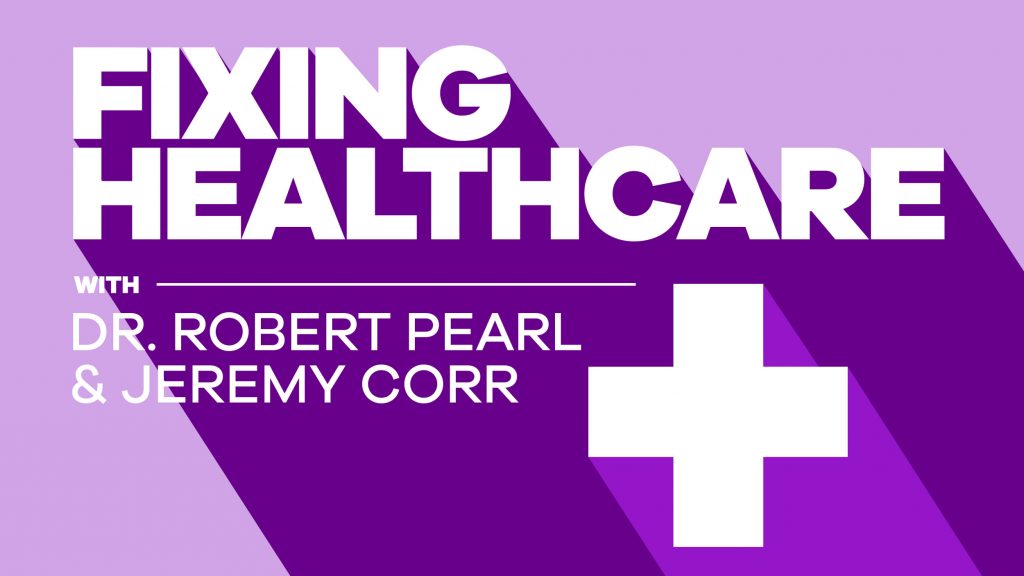Podcast: Play in new window | Download
Subscribe: Spotify | Email | RSS | More
The Fixing Healthcare podcast is back with a new candidate for the highly coveted (and totally fictitious) job of “Leader of American Healthcare.”
Dr. Halee Fischer-Wright is author the national bestseller Back to Balance: The Art, Science, and Business of Medicine, and president and CEO of Medical Group Management Association (MGMA), the premier membership association for professional administrators and leaders of medical group practices.
Dr. Fischer-Wright brings a unique perspective to the role of fixing American medicine. As a former pediatrician, management consultant and chief medical officer, Dr. Fischer-Wright has seen the healthcare industry from practically every angle. As CEO of MGMA, she and her colleagues represent roughly 50% of the healthcare delivered throughout the United States. Dr. Fischer-Wright is a nationally renowned speaker, recipient of numerous awards for leadership in healthcare, and one of Modern Healthcare’s “Top 25 Women in Healthcare.”
This month, she joins Fixing Healthcare for what’s being called “The Toughest Job Interview In Healthcare.” The show’s co-hosts and “hiring managers” Dr. Robert Pearl and Jeremy Corr have asked Dr. Fischer-Wright to present a plan to fix healthcare.
Here’s what she had to say:
I didn’t have one moment where I knew healthcare was broken. Instead, it was a series of personal experiences that brought the deeper problems into the light. The day that I watched my dad get poked again and again for a spinal tap by residents and interns who didn’t speak to him or even look him in the eye. The moment I realized that my husband and I could possibly lose our home because of crushing medical bills after his cancer surgery. The night my mother convinced herself that she had ALS by Googling the symptoms and double checking it with WebMD. The problem with talking about all these underlying problems in healthcare is that we lose sight of what healthcare is.
Healthcare is one human trying to help another get and stay healthy. Healthcare is human, personal and intensely local. And yet we take an army of problem solvers and innovators, and prevent them, daily, from making decisions that could dramatically transform healthcare. I’m talking about every provider, leader, clinician, staff member working in a medical practice, and the patients they serve.
In my design of the future of healthcare, I’m choosing to ignore everything at the top and start with all the experience and brilliance and passion and, most importantly, the common sense that I see in medical practices every day. In fact, I’m recommending that we do the exact opposite of what we’re currently doing.
First, I’d ask: ‘Do we really know what we want out of healthcare?’ While we keep talking about cost, quality and satisfaction—the triple/quadruple aim—is that really what patients want? Meaning, every single one of us. Would that be what I tell you I personally want? Or do we as policymakers and professionals use those as surrogates because we struggle to deliver what patients really want: to be healthy and trust in all of the institutions that are supposed to take care of them. That includes not just the practices and hospitals, but also the insurance companies, the policymakers and every other player in the system.
We have to treat the whole person and not just the disease. We have some amazing practices in the country that are pushing really hard for that idea: Iora Health, the Methodist Health System in Nebraska, and the Mayo Care System. They’re succeeding by focusing on outcomes and not just the preconceived notion of all-mighty processes to get to those outcomes.
I believe that empowered partnerships, in which the right people have the right amount of control over the right decisions, are crucial to building a culture of excellence in the whole industry. If we all trust that every other player in the industry is making decisions with the same goals in mind, we’ll be more collaborative in decision-making and contributing to that progress, and we’ll be more willing to share ideas far and wide. We need trust, though, and right now we definitely don’t have it.
What empowered partnerships can help eliminate is that tendency to hunt for silver bullets, or so-called disruptive ideas. Because when you have excellence, you don’t need disruption.
There are so many solvable problems and yet we keep making many of them worse. Two of the biggest are administrative complexity and regulatory burden. Solve them, and you rapidly save hundreds of billions of dollars, reduce burnout, improve frontline satisfaction and free up amazing time and resources that can be used to improve life expectancy and improve the health of people, leading to quality outcomes.
Since 2011, just the direct costs for managing claims, billing and collections for primary care practices have increased by 74%, which is ironic since we’re supposedly at a time where technology and electronic transactions are supposed to be making everything more efficient. A journal article put the total cost of billing and claims at $471 billion in 2012. If we saved just 50% of that, that gives us our decrease in cost.
A recent AMA survey shows that practices spend 14.6 hours per physician per week on prior authorizations. If I gave any physician back 14.6 hours per week, I guarantee you we would increase life expectancy and improve quality outcomes.
The solutions exist and they’re actually right in front of us. With a little collaboration and common sense, they could be executed on in the next 18-24 months. And these simple things that are right in front of us would have dramatic and lasting effects toward better outcomes …
READ: Full transcript of our discussion with Dr. Fischer-Wright
* * *
Fixing Healthcare is a co-production of Dr. Robert Pearl and Jeremy Corr. Subscribe to the show via Apple Podcasts or wherever you find podcasts. Join the conversation or suggest a guest by following the show on Twitter and LinkedIn.

